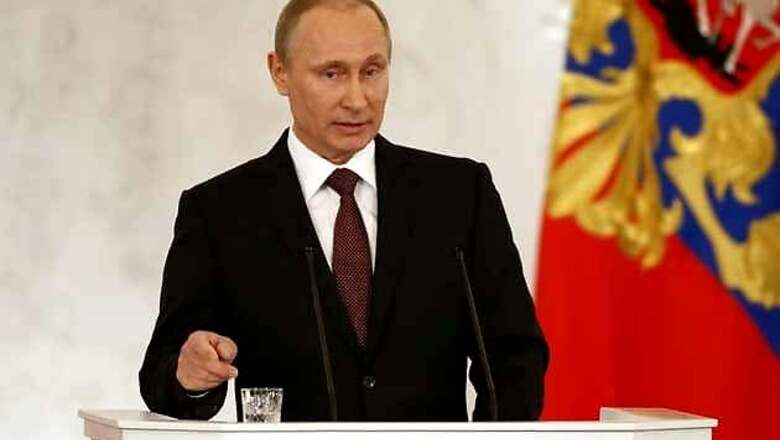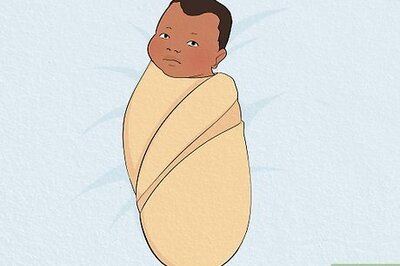
views
New Delhi: Some places come with a fixed, immutable stereotype. For Indian students brought up reciting Tennyson's "Half a league, half a league..." under serious-looking English teachers, the Charge of the Light Brigade would be about the only introduction to Crimea, the region so much in the news today. The ill-fated brigade was among the many outsiders which made Crimea famous as a contest ground for great powers.
Geography plays a major part, as elsewhere. Crimea, if you look in the map, is a peninsula jutting into the Black Sea, connected to what is now Ukraine through a narrow isthmus, and is key to holding the Black Sea. Situated as it is at the meeting point between Europe, Russia and Turkey, and commanding the only warm water sea the Russians can hope for, Crimea has always hosted other peoples'ambitions.
For the longest time, Crimea and the Black Sea was a Greek, Roman and Byzantine colony, till the Golden Horde Mongols, inheritors of Genghis Khan's empire set up camp. The word 'Crimea' comes from 'Krem', Mongol for 'fortress', and conflict has been its destiny ever since. After the Mongols, a Ghenghis descendant, a Tartar tribesman, started his own franchise, bringing the place under the Crimean Khanate, and although the Ottoman Turks eventually exerted political dominance over them, the Tartars managed to get by.
But a new power had arisen by the 18th century: Russia. Ironically, while the giant Russian bear today can bully Ukraine into difficult choices with ease, Russian identity is intimately connected to Ukraine's. A little more than a thousand years ago, a small principality arose to prominence in the region, starting from Kiev, which is now the Ukrainian capital. This was Kievan Rus, which ultimately disintegrated, and its eastern part expanded into Russia today. Its western part became Ukraine, and a tiny, tiny part Belarus. Which is why they are called "the three Russias': Great Russia (Russia), Little Russia (Ukraine) and White Russia, which in Russian becomes Belaya Rossiya, or Belarus. Eastern European history is full of such ironies.
Over time the Russians ejected Tartars and Ottoman control from Crimea, and began a cultural cleansing on a scale as epic as it is relatively obscure. Populations were transferred, Russian Christians were imported, mosques were replaced by Russian Orthodox churches and the face of the entire region was changed. It has stayed that way ever since, but this just goes to show the Russians are not new to cultural warfare either.
The expanding Russian Empire was bound to clash with the Ottoman Turkish Empire, and the prize, expectedly, was the Black Sea region. Russia, as mentioned, has always needed the Black Sea for winter port facilities, but Black Sea shipping is hostage to a tiny Mediterranean opening in its south, the Bosporus, over which Istanbul stands. In the 1850s, Russia picked a fight with the Ottomans over the rights of Christian subjects in the latter Muslim empire. Britain and France, as always, intervened, this time on the Ottoman side, and the Crimean War was on. Most of this conflict was fought on the peninsula, around the massive Russian fort of Sevastopol.
The Russians eventually called for peace, but not before the world got to know of the Light Brigade, Florence Nightingale, and such fringe benefits as the monkey cap, or balaclava, named after the Crimean town south of Sevastopol which saw massive fighting.
Over the next few decades, Russian and Ukrainian identities became ever more distinct, although Ukraine as an independent kingdom had long been swallowed by the Russian Empire. It took another epic conflict to shake things up. As with virtually everything else, the Nazis were responsible for this too.
Nazi Germany's invasion of the Soviet Union during the Second World War might have been unsuccessful, but not before they'd taken Ukraine and reached the Crimean peninsula. Sevastopol once again saw some of the bitterest fighting of the war, and the people of the peninsula, along with other Ukrainians and Russians, suffered.
Crimea's history after the war is a case of Soviet whimsy. USSR Chairman Krushchev was said to be very fond of Ukraine, although like almost everything else about the Soviets, this too might be propaganda. In the 1950s, like some medieval monarch, Kruschev gifted Crimea to Ukraine, saying in effect "here's something that once belonged to you, you've been good Soviet citizens, so you can have it back". And so like a geo-strategic football passed on from empire to empire, Crimea found its way back to Ukraine.
But that was then, an a new emperor lives in the Kremlin today. Eastern Ukraine, which has a sizeable Russian population, also has sizeable mineral resources and natural gas, which Russia wants, and Crimea continues to be a giant natural aircraft carrier for the Black Sea. So Russia has made its move, and the Ukrainians, as far as Moscow is concerned, can like it or lump it. Considering how bitterly Crimea has been fought for by empires down the ages, such men as the Byzantine and Ottoman emperors, or Russian Tsars, or Mongols chieftains would be green with envy at Putin's masterstroke.


















Comments
0 comment